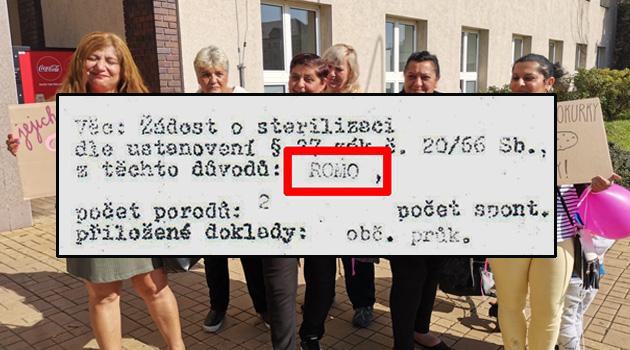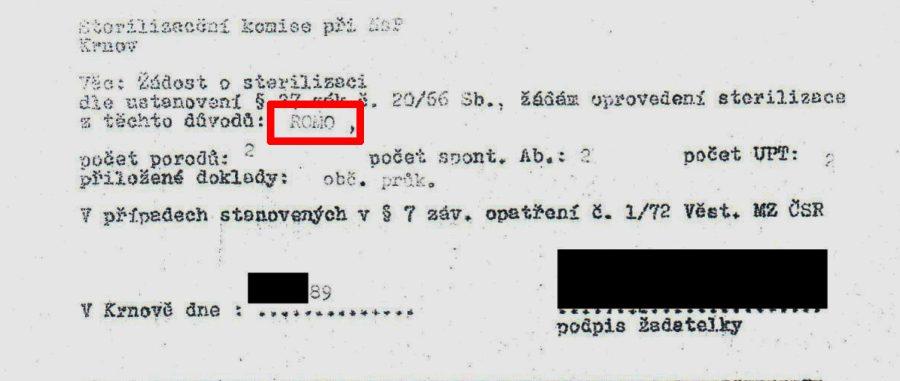Czech Health Minister reverses his ministry's decision: Applicant has been awarded compensation for being unlawfully sterilized

The Czech Health Minister has reassessed the Health Ministry's initial decision to reject an application for compensation for a sterilization that was undertaken on the discriminatory grounds of the patient's race. The application was first rejected despite the patient's Romani origin being listed in the medical record as the grounds for her sterilization.
The unlawfully sterilized woman will now be compensated CZK 300,000 [EUR 12,000]. “In the case of our client who applied in the autumn of 2022, her application was rejected despite the fact that the reason for her sterilization was expressly listed in her medical records as her Romani origin. Although we submitted a legal argument to that effect and other arguments in the original application, the Health Ministry did not express any view of its own about those arguments in its decision and rejected her application as unjustified. This is our first successful appeal, our other appeals have been rejected so far,” the Human Rights League, which is representing the applicant, stated in a press release.
The applicant’s attorneys argued that serious deficiencies were discovered in the decision-making process about whether to perform the sterilization. These included, for example, the absence of all the elements necessary to the application for sterilization, the absence of minutes from the sterilization commission that reviewed the application, the absence of free and informed consent to the operation, and the absence of any written instructions to the patient as to the irreversibility of the surgery.
Another important deficiency in the decision-making process about whether to perform the sterilization was that the discriminatory grounds of the patient’s race were listed both in the application for the sterilization and in the protocol from the commission on the sterilization. The Health Ministry originally refused to respond to the applicant’s submission of that evidence to substantiate her claim that she was unlawfully sterilized.
Several instances of misconduct were ascertained from the documentation and the ministry’s original decision to reject the application for compensation, according to the arguments made by the applicant and her lawyers. According to the case file documentation that is part of the medical records, it is highly probable that the word “ROMO” in both the application for sterilization and in the protocol from the sterilization commission meeting is a reference to the patient’s ethnic origin.
“Taking the ethnic origin of an applicant for sterilization into consideration contravened the legal regulations that were in force at the time. Since the ministry, in the decision under review, never expressed a view of the applicant’s assertions, which were reiterated during the proceeding by a statement from one of its units, it encumbered its decision with being non-reviewable, in part,” the Human Rights League argued.

Another basic deficiency, according to the Human Rights League, was the phrasing of consent to the operation in general terms (“I agree to an operation”) and the patient’s signature. “The consent in the medical records is written on the back page of the insert about the operation and is limited just to the words ‘I agree to an operation’, without further specification, and the patient’s signature. The document does not mention any form of instruction about the operation having been given to the patient. No information on the patient having been instructed about the operation appears in any other documents in the file. The circumstances documented can be considered to have seriously violated the patient’s ability to make her decision whether to consent to the operation free of any coercion and without any misunderstanding of what it entailed,” the Human Rights League said.
According to the Human Rights League, the Health Minister has now corrected the Health Ministry’s previously incorrect decision through his appeals decision, thanks to which the woman, who has an unambiguous claim to compensation, will now be compensated. “The appeals decision’s argumentation, moreover, clarifies that patients are entitled to give their consent to medical procedures free of any coercion and on the basis of complete information, and it also clarifies that instruction on medical procedures to patients is necessary – these are areas where the Health Ministry’s past decisions whether to award compensation in these cases have been ambiguous and inconsistent,” the Human Rights League says in its press release.